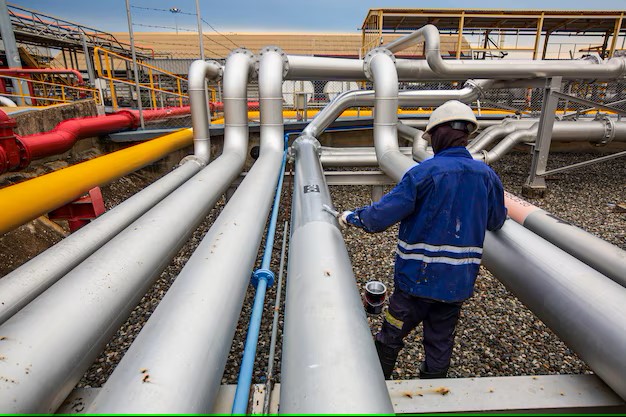- Description
- Reviews
Course Overview
This 5-day specialised training program is designed to provide participants with the knowledge and skills required to manage risks associated with pipeline operations effectively. The course introduces risk management frameworks, focusing on hazard identification, risk assessment methodologies, and mitigation strategies to prevent pipeline failures, leaks, and accidents.
Course Objectives
By the end of this course, participants will be able to:
-
Identify and evaluate potential hazards and risks associated with pipeline systems.
-
Apply risk management frameworks to assess and prioritise pipeline risks.
-
Implement effective monitoring and control strategies to mitigate identified risks.
-
Develop and maintain risk management plans aligned with industry standards.
-
Ensure compliance with regulatory requirements for pipeline safety and integrity.
-
Establish emergency response strategies to address pipeline incidents and minimise impacts.
Target Audience
-
Pipeline engineers and risk managers.
-
Operations and maintenance personnel in pipeline systems.
-
Asset integrity specialists and safety officers.
-
Environmental and compliance professionals in the oil and gas sector.
-
Supervisors and managers involved in pipeline projects and operations.
Daily Agenda
Day One: Fundamentals of Pipeline Risk Management
-
Introduction to Risk Management: Definitions, principles, and objectives.
-
Overview of Pipeline Operations: Key components and processes.
-
Risk Factors in Pipelines: Corrosion, third-party interference, operational errors, and environmental conditions.
-
Regulatory Frameworks and Standards: Understanding international and regional regulations (e.g., API 1160, ISO 31000).
-
Pipeline Hazard Identification: Techniques for identifying hazards in pipeline systems.
-
Case Study: Analysis of a pipeline failure due to inadequate risk management.
Day Two: Risk Assessment Methodologies
-
Qualitative and Quantitative Risk Analysis: Applications in pipeline operations.
-
Probability and Impact Assessments: Evaluating risk likelihood and severity.
-
Pipeline Integrity Assessment Tools: Inline inspection (ILI), acoustic monitoring, and other diagnostic technologies.
-
Risk Mapping and Prioritisation: Creating risk matrices to prioritise mitigation efforts.
-
Workshop: Conducting a risk assessment exercise for a hypothetical pipeline scenario.
Day Three: Risk Mitigation Strategies
-
Corrosion Control Techniques: Coatings, cathodic protection, and chemical inhibitors.
-
Preventing Third-Party Interference: Right-of-way monitoring and public awareness campaigns.
-
Pipeline Monitoring Systems: SCADA, leak detection systems, and remote sensing technologies.
-
Operational Controls: Optimising pressure, flow rates, and temperature to minimise risks.
-
Integration of New Technologies: Using AI and predictive analytics for proactive risk management.
-
Case Study: Evaluating the success of mitigation measures in a real-world pipeline project.
Day Four: Risk Management Planning and Emergency Response
-
Developing Risk Management Plans: Essential components and implementation steps.
-
Emergency Response Protocols: Designing and testing response strategies for pipeline incidents.
-
Crisis Management and Communication: Engaging stakeholders during emergencies.
-
Incident Investigation and Root Cause Analysis: Techniques for understanding and preventing recurrence.
-
Regulatory Compliance and Documentation: Ensuring thorough reporting and adherence to standards.
-
Practical Exercise: Creating a risk management and response plan for a pipeline system.
Day Five: Advanced Risk Management and Sustainability
-
Risk Management Frameworks: Integration with enterprise risk management systems.
-
Sustainable Risk Management Practices: Balancing operational efficiency with environmental protection.
-
Continuous Improvement in Risk Management: Using feedback and performance metrics to refine strategies.
-
Emerging Trends and Challenges: Adapting to evolving risks in pipeline operations.
-
Final Assessment: Participants present a pipeline risk management strategy.
-
Wrap-Up: Summary of key takeaways and course feedback.
Why Choose this Course?
This course provides pipeline professionals with the tools and techniques needed to manage risks proactively, ensuring the safety, reliability, and environmental sustainability of pipeline operations. By combining theoretical knowledge with hands-on training, the program equips participants to address current and emerging challenges in pipeline risk management effectively. Attendees will benefit from practical insights, case studies, and expert-led discussions, enabling them to implement robust risk management strategies that enhance operational safety and compliance.
Learning Outcomes
Upon completing this course, participants will:
-
Be able to identify, assess, and mitigate pipeline risks effectively.
-
Understand and apply advanced risk assessment methodologies and tools.
-
Develop comprehensive risk management and emergency response plans.
-
Implement industry best practices for monitoring and controlling pipeline risks.
-
Ensure compliance with regulatory frameworks and environmental standards.





